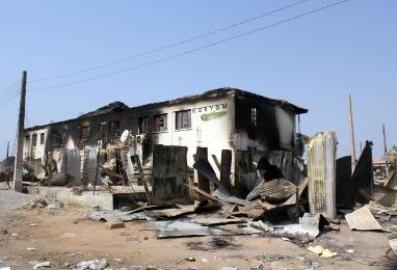Jonglei traders demand governor resolve hard currency stand-off
November 12, 2014 (JUBA) – Traders in Jonglei state capital Bor have demanded caretaker governor John Kong Nyuon “resolve grievances” over disparities in relation to a $10 million letter of transfer awarded to reportedly dubious importing companies.

The purchase orders issued by the Central Bank enable companies to access US dollars from commercial banks.
Following fierce clashes between government and rebel forces for control of Bor in December 2013 and January this year, businessmen said destruction to properties and widespread looting has resulted in losses of at least $300 million.
In February, traders called on president Salva Kiir to instruct the Central Bank to allot businesses from Bor hard currency to enable them to import from neighbouring countries.
The president reportedly instructed the Central Bank to ensure that traders from the war-ravaged states of Jonglei, Upper Nile and Unity are provided with letters of credit totalling $10 million every three months to purchase US dollars from commercial banks.
However, traders claim the system has been open to abuse.
“The businesses, which are feeding the thousands of returnees to the state [capital Bor], are not getting the critical support [needed], with hard currency allocations going to “unscrupulous, highly connected government officials,” a statement issued by local traders and extended to Sudan Tribune said.
“The leaders of the Jonglei Chamber of Commerce that represents traders have given governor John Kong Nyuon until Friday (14 November) to resolve this issue to avoid stern action,” the letter added without providing further details.
In a separate interview with Sudan Tribune on Wednesday, Abraham Chol Kech, the secretary of the traders union in Jonglei, said local traders are being outcompeted on the market, with prices of basic items surging on daily basis.
“Foreign traders went back to their countries after losing their businesses in Bor, but they came back – thanks to the help [of] their government,” said Kech.
Chol said traders reopened their shops last Friday after the governor assured them that he will personally write to the South Sudan’s Central Bank requesting it cease issuing new letters of credit to Juba-based business claiming to be supplying Jonglei state.
“The traders hold the keys to their shops and if the state government is not ready to work with us, we can relocate to other states in South Sudan where there is [a] better business environment,” Kech said when asked what other options traders have open to them.
Traders said that out of the 40 companies awarded the first letters of credit in April, only eight businessmen benefited, with the remainder going into the pockets of “government officials, their relatives and Juba-based dollar dealers”.
According to traders. out of 24 companies to receive the letters of creditin September, only one legitimate businessman received $300,000 to import goods, with the rest of the $10 million going to so-called “briefcase companies”.
“Inflation has hit the roof in Jonglei since traders are buying dollars expensive on the black market to purchase goods from outside [South Sudan] borders,” traders said in their statement.
Cement is among the items that have skyrocketed in cost as a result, and is currently being sold at 135 South Sudanese pounds (SSP), up from 75 SSP in April.
“We find ourselves pushed to the wall, but we have not yet lost hope in our governor’s ability to defuse this tension,” the statement said.
Jonglei’s minister of information, Jude Jonglei Boyoris, said the state government has no jurisdiction over hard currency allotment and could not say when the Central Bank would respond to their request.
“The letter [written to the Central Bank of South Sudan by the governor] is being processed and we don’t know what will happen,” Boyoris Sudan Tribune by phone from Bor on Wednesday, adding that the matter will need to be “followed up.”
(ST)
– Jonglei capital begins recovery amidst challenges
– Bor businessmen count their losses after conflict
– Aftermath of Bor reveals widespread destruction
